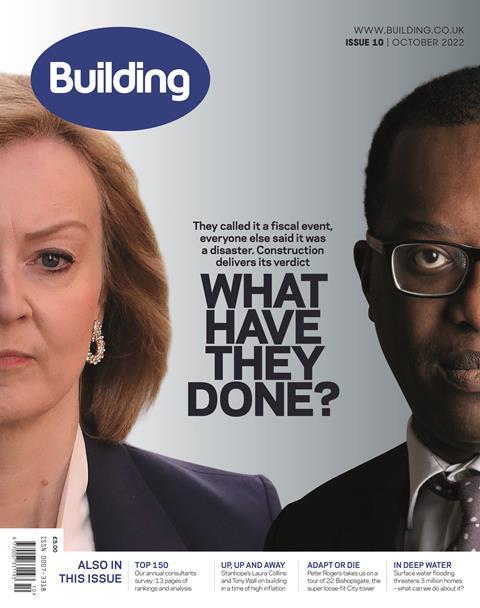Firms were already grappling with severe inflation, an energy crisis and a tight jobs market ÔÇô now the mini-Budget has made their problems even bigger
ÔÇťGrowth, growth, growthÔÇŁ ÔÇô this is what Liz Truss is staking her premiership on, and despite a frankly disastrous start as PM, she seems intent on repeating the mantra until we all finally get it. The thing is business does get it.
Who would argue with wanting the countryÔÇÖs GDP to grow 2.5% a year? But where the business community ÔÇô and many economists ÔÇô disagree with Truss and her chancellor Kwasi Kwarteng is how best to grow the economy and how quickly it can be done.

Last monthÔÇÖs now infamous ÔÇťfiscal eventÔÇŁ shocked and even horrified many of the people we contacted for reaction in the days and weeks that followed. In normal times most media coverage of a Budget announcement ÔÇô mini or otherwise ÔÇô focuses on the package of announcements.
We would have pored over the details of changes to stamp duty thresholds or the infrastructure projects receiving new (or perhaps renewed) backing. But when KwartengÔÇÖs fiscal bombshell landed, all of that seemed irrelevant as the pound plummeted against the dollar, the Bank of England stepped in to save pension funds, and mortgage lenders removed hundreds of products from the housing market.
>> Also read: KwartengÔÇÖs growth plans: what does it all mean for infrastructure projects
Before all this chaos, firms were grappling with severe inflation, the energy crisis and a tight jobs market. Already the threat of a recession loomed; now Trussonomics has made that a near certainty. As the cost of borrowing rises, clients are expected to put projects on hold or on the ÔÇťgo-slowÔÇŁ, or even abandon them altogether.
Of course, the worst-case scenario might not play out and many parts of construction and housebuilding have proved surprisingly resilient during the covid crisis, but the data is showing a slowdown in project starts and there are forecasts that housebuilding rates might fall 40% next year.
Business leaders understandably objected to being cast as the villains in a twisted Robin Hood tale
The new team at the top of government squandered its opportunity to set out a credible growth plan because it focused on tax cuts ÔÇô with no details of how to pay for them ÔÇô ahead of other longer-term measures to drive productivity. Business leaders understandably objected to being cast as the villains in a twisted Robin Hood tale in which Kwarteng and Truss took from the poor to give to the rich. None of the bosses we spoke to as earners of over ┬ú150,000 needed or called for the removal of the 45p rate of income tax. While the U-turn on that policy has been welcomed, it has left more than a bad taste in the mouth ÔÇô many now question the governmentÔÇÖs fiscal competence, with one boss saying it makes them ÔÇťlook like theyÔÇÖre from junior schoolÔÇŁ. Ouch.
It is now playing catch-up, with the chancellor trying to restore some credibility by bringing forward the debt-cutting plan along with the Office for Budget ResponsibilityÔÇÖs forecast for the economy and public finances to 31 October, otherwise known as Halloween (as if we hadnÔÇÖt all been spooked enough already). The hope is that this will calm market nerves, but will it set us on the path to growth? Few think so. For that we need much longer-term thinking.
This is not a party political point; it is about how politics in this country does not seem up to the job. If you listen to economists talking about the UKÔÇÖs entrenched low growth, they point to successive governmentsÔÇÖ failure to properly invest in innovation, skills and infrastructure over decades. Compared with other advanced economies, the public and the private sectors in the UK under-invest in all these areas.
So what will finally kick-start private sector investment? Truss and KwartengÔÇÖs free market view favours lower taxes ÔÇô so far that has not gone to plan, but over a longer period a business-friendly tax regime would no doubt help many firms. But actually what matters more than whether tax rates are high or low is having some consistency and certainty. Firms are crying out for politicians to stop tinkering and flipÔÇĹflopping ÔÇô the recent IR35 U-turn is a case in point ÔÇô so they can make plans and invest in their futures.
>> Also read: Top 150 contractors
>> Also read: Calls for a national retrofit programme are mounting, but will the PM listen?
Deregulation is another Truss favourite, and in theory initiatives such as the innovation zones could help regenerate areas by attracting private investment with tax breaks and easing planning restrictions. Meanwhile there are signs that Simon Clarke, the levelling up secretary, is preparing the ground for another go at wider planning reform to remove barriers to housebuilding. Logically this makes sense: if liberalised planning rules will unlock development, why restrict reform to a certain number of zones? But this is where theory and political reality collide ÔÇô just remember the fate of Robert JenrickÔÇÖs reforms. A less painful route identified by planners and developers alike would be to properly fund planning departments ÔÇô this would speed up decisions and require no legislation. But in this fiscal climate that seems increasingly unlikely.
So back to Truss and her ÔÇťdash for growthÔÇŁ. We get it, we do. We all want to live in a country with highly skilled, well-paid jobs, modern infrastructure that connects people and places, technology that makes us more productive, and ultimately a richer population with better prospects for the next generation. But that all takes time. And as business owners know from bitter experience, the biggest deterrent to growth is political instability. Does Truss get that?
Chlo├ź McCulloch is the editor of ║┌Â┤╔šă°



























